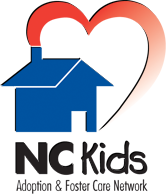Who can adopt a child?
In North Carolina a single person or married couple can be an adoptive family. You must be 18-years-old to adopt and 21-years-old to foster. You do not have to own a home or have a certain amount of income to be an adoptive parent. You should consider what it will mean to have a child join your family and how this will affect your family’s life and the child’s life. With a full commitment and realistic expectations, adoptive parents must be ready to give a child or children opportunities to develop to their full potential physically, academically, socially and emotionally.
(NC Department of Health and Human Services)
Qualities and Characteristics Agencies look for in a Foster or Adoptive Family
Each child is different. Some children need to be with a single parent, some need a two-parent family; some need other children in their family while some need to be the only child in their home. Many different types of families are needed to parent these special children. All children need stability and a family they can count on through good times and challenging times. Children need to stay in touch with people they love such as former foster parents, birth parents, siblings and teachers. It is extremely important that foster and adoptive families consider their openness to maintaining these important connections for children involved in the foster care system. It is important to remember that the process is child-driven and that the child’s agency is seeking the best possible family to meet that individual child’s specific needs. However, they are not looking for perfection. Keep in mind “you don’t have to be perfect to be a perfect parent!”
Children in Care
Children in the custody of the Stanly County Department of Social Services have a wide variety of characteristics. Most of our children are no different than the children you know. You see them in the park, the grocery store, in church. They are tall, short, young, older, bright, active, imaginative, and always on the go. Some are physically handicapped, behaviorally challenged, or have mental limitations. They may be involved with the juvenile court system or with mental health officials, but these children all need one common thing in their lives… a stable and supportive family.

Meet the Children
There are many North Carolina children waiting to be part of a family.
Steps to become an adoptive parent
Becoming an adoptive parent doesn’t happen overnight. It usually takes several months to complete the licensing process once the mandatory classes are finished.
✔ Choose an agency, local DSS or private adoption agency.
✔ Attend an orientation meeting with your chosen agency.
✔ Complete TIPS-MAPP course. This is optional for adoptive families but strongly encouraged and mandatory through some agencies.
✔ Completion of Pre-Placement Assessment (PPA) This is your adoptive home study and is different from the Mutual Home Assessment that foster parents receive. If you want to adopt you must have a PPA. PPA’s must be updated every 18 months or when a significant change occurs within your family or household.
✔ Once you have an approved PPA, you can register with AdoptUSKids to make inquiries regarding children available for adoption.
✔ Once you have obtained an approved PPA, you may also register with the NC Kids office. You will then be added to a database of approved families and waiting children that is used to find potential matches for waiting children. To register with NC Kids please complete the Family Registration Form and return it along with a copy of your approved PPA. Please note that registration with NC Kids is optional and does not guarantee that you will be matched. It is simply one option available to you in your adoption journey. We encourage you to search for children on your own through the AdoptUSKids or NC Kids’ websites.
✔ Submit your PPA for children in need of an adoptive home or be matched for adoption with a child you are already fostering.
✔ Once matched, engage in a meeting and transition plan to move the child to your home.
✔ Complete the legal adoption process, culminating in a final decree of adoption.
Please check back here for Fall 2021 MAPP course dates.
Personal Qualities
Foster parents shall be selected on the basis of having personal characteristics and relationships which will permit them to undertake and perform the responsibilities of caring for children, in providing continuity of care, and in working with a social agency. Persons who have a substantiated report of abuse or neglect may not be eligible for licensure as foster parents. Foster parents should be persons:
- care about others and are responsive to them:
- are able to give affection and care to a child in order to meet the child’s needs;
- an enjoy being parents;
- have the capacity to give, without expectations of return;
- have worked out between themselves a satisfactory and stable marital relationship, without severe problems in their sexual identification, or in their relationship with each other;
- are able to maintain meaningful relationships, free from severe conflict with members of their own families as well as with others;
- have reputable characters, acceptable values and ethical standards conducive to the well –being of children;
- give evidence of flexibility in their expectations, attitudes, and behavior in relation to the needs and problems of children, and the ability to use help to meet the problems of family living, when it is needed;
- are able to accept the child’s relationship with his/her parent(s) and with the agency.
Physical Facility
Fire and Building Inspection
- All homes must have at least one 5-pound, ABC type fire extinguisher mounted and a CO detector in the home. The fire extinguisher must be checked biannually.
- Extension cords: The use of drop cords and extension cords should be limited to temporary utilization on appliances and equipment.
- Fire Evacuation Plan: The fire evacuation plan must be posted in an obvious location to everyone in the house. It is recommended that the plan be posted in the sleeping areas and the area next to the phone or bulletin board.
- Telephone: All foster homes must have a working telephone and emergency numbers posted.
- Smoke Detectors: All homes must have one smoke detector outside each sleeping area that is within 10 feet of each bedroom door, with at least one smoke detector on each level.
- Chemicals/Flammables: These must be stored in a safe and proper manner and out of reach of foster children.
- Source of Heat: The primary source of heat must conform to state and local codes. The secondary source of heat (portable/space heaters) must be used only in living areas and must be extinguished at bedtime. Home has heating, air cooling or ventilating capability to maintain comfort range between 65 and 85 degrees F.
- Bedrooms: Bedrooms shall be clearly identified on a floor plan as bedrooms and shall not serve dual functions. No day bed, convertible sofa, or other bedding of a temporary nature shall be used except for temporary care of up to two weeks.
Before a home is fully licensed, and biannually thereafter, it must be inspected and receive a satisfactory rating on the fire and building safety inspection report and on the inspection form for residential care facilities.
Environmental Regulations
- The home and yard shall be maintained and repaired so that they do not appear to be hazardous to the children in care.
- The house shall be kept free of uncontrolled rodents and insects.
- Windows and doors used for ventilation shall be screened.
- The kitchen shall be equipped with a working stove and refrigerator and adequate eating, cooking and drinking utensils which are cleaned and stored for use.
- Household equipment and furniture shall be in good repair.
- Explosive materials, firearms (guns), and ammunition must be stored separately in locked places.
- Documentation that household pets have been vaccinated for rabies is maintained by the foster parents.
- Inflammable and poisonous substances, medications and cleaning supplies shall be stored out of reach of foster children.
The social worker confirms these regulations are met during a home visit.
Are you willing to open your Heart and Home to a Child?
If you are interested in becoming a foster parent or in learning more about the program, please call us at
704-982-6100 or contact:
Jessica Stevens, Licensing Social Worker
(704) 986-2036
jstevens@stanlycountync.gov
Amy Little, Foster Care Social Worker
(704) 986-2035
alittle@stanlycountync.gov
Stacey McCroskey, Foster Care/ Adoptions Social Worker
(704) 986-2030
smccroskey@stanlycountync.gov
Kathy LeFloch, Children’s Services Supervisor
(704) 986-2010
klefloch@stanlycountync.gov
Want to get involved but not sure about adoption?
You may not feel you can be an adoptive parent, but you still want to get involved. There are many ways you can help the children in Stanly County. Please call us to find out how.
704-982-6100
Stanly County DSS
Albemarle, North Carolina 28001
704-982-6100
Normal Business Hours:
Monday-Friday 8:30am-5:00pm

